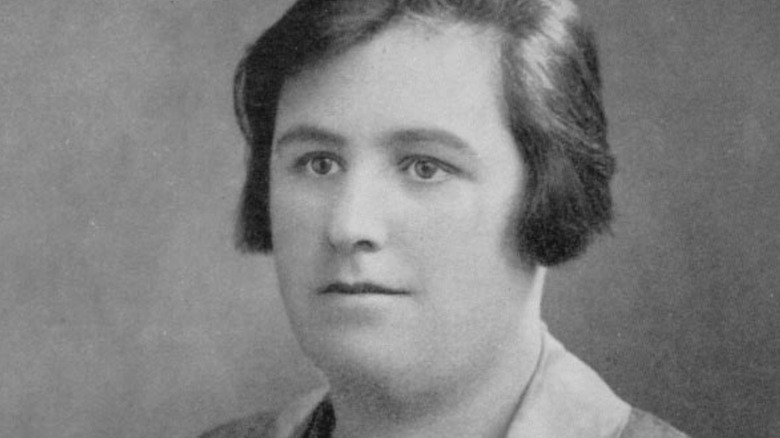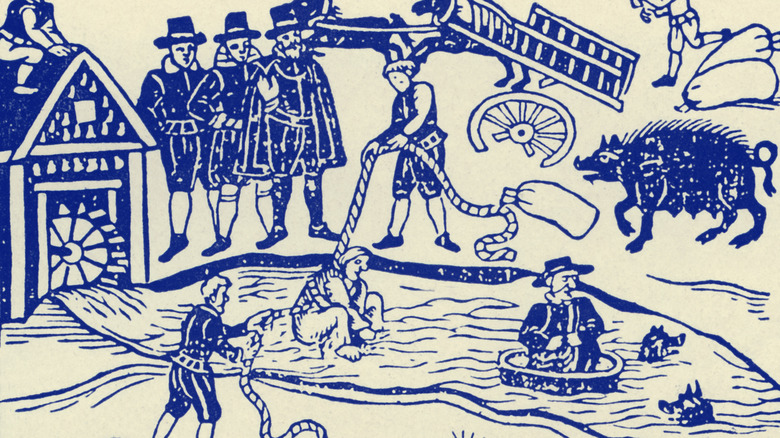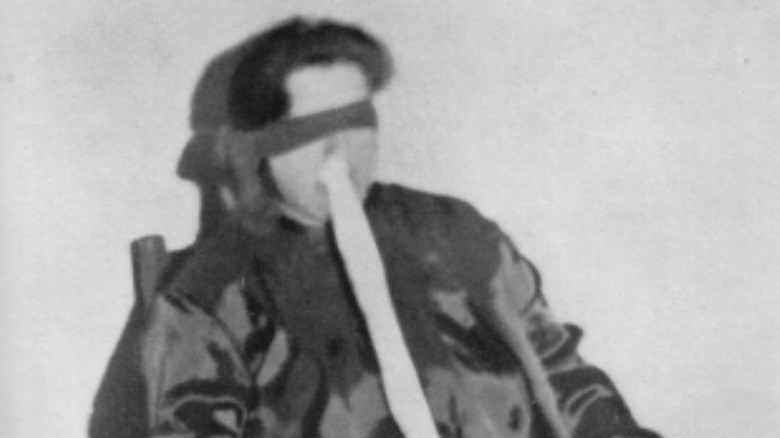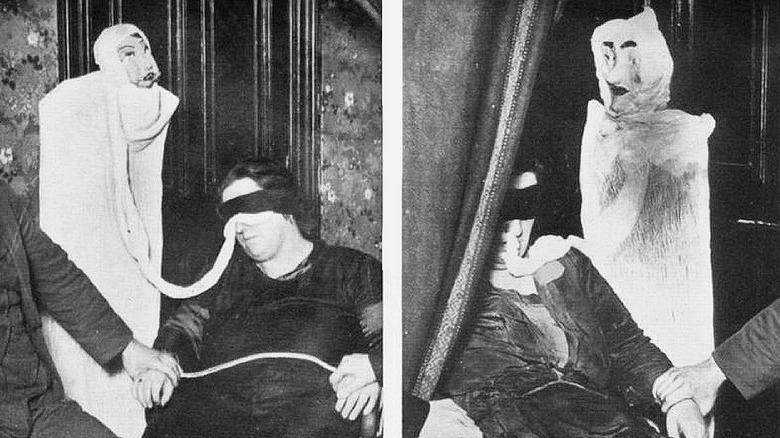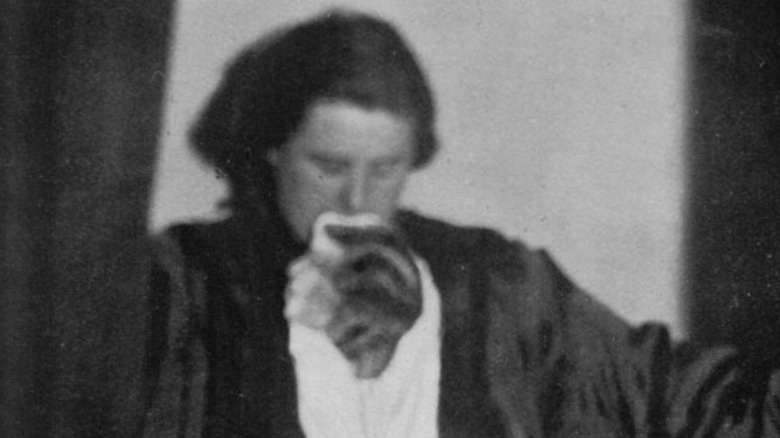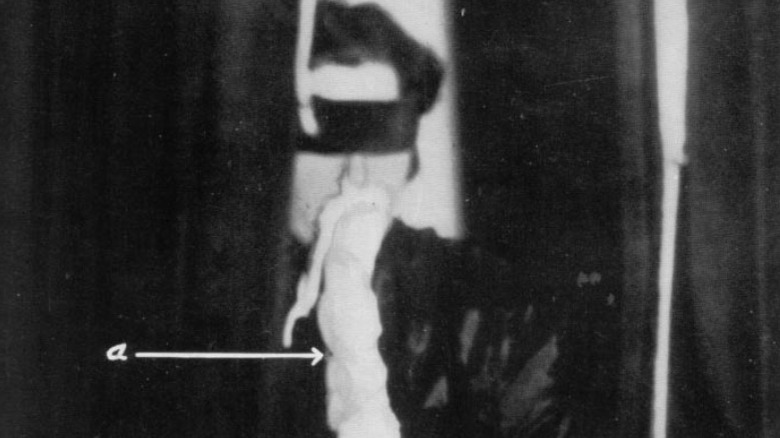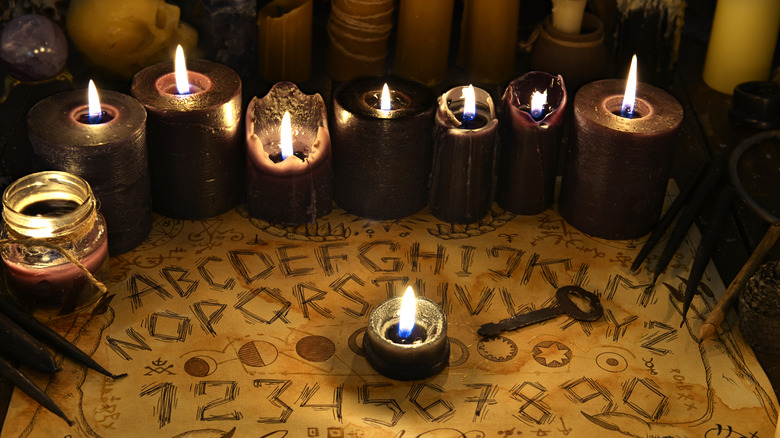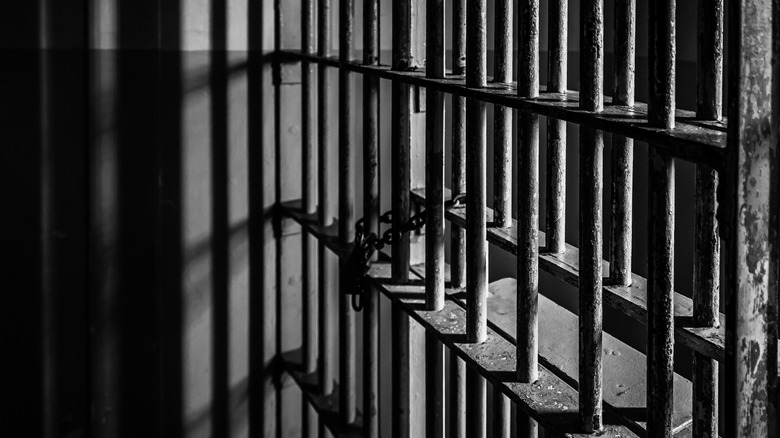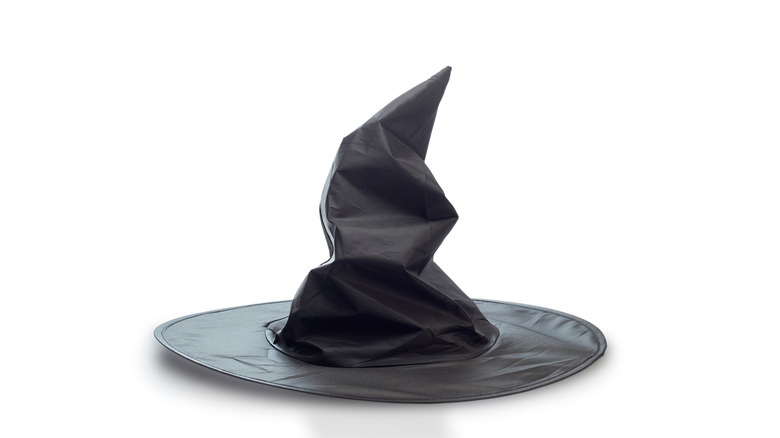Here's Why A Medium Was Jailed Under The Witchcraft Act During WWII
Whether or not Helen Duncan was actually the last witch of Great Britain, she was in fact the last witch in Great Britain to be imprisoned. And although one considers the persecution of witches to be relegated to the Renaissance or the Enlightenment, the British government actually took up its case against Duncan in the mid-20th century. Maybe Duncan could actually talk to dead spirits and she truly did stumble upon a government secret. Or maybe she just happened to make one unlucky guess. Either way, in the midst of the Second World War, the British government found itself accusing one of its citizens of pretending to be a witch.
Ultimately, the trial wouldn't claim to decide whether or not Duncan was actually a witch or not or whether or not the paranormal exists. However, they were able to effectively argue that Duncan was claiming to be in possession of supernatural abilities that she did not in fact have.
By this point, the government also couldn't actually prosecute people for being witches, but they could prosecute people for claiming to be a witch. And as a result, in 1944, one woman who said she had a connection to the paranormal became one of the last people to be prosecuted in Great Britain for claiming to have supernatural powers. This is the story of Helen Duncan: a medium who was jailed under the Witchcraft Act during WWII.
The Witchcraft Act of 1735
Throughout the Renaissance and the Enlightenment, people who were deemed to be witches were viciously persecuted by the European and North American populations. England's first witchcraft law was enacted in 1542 and for the next 200 years, witchcraft was repeatedly underlined as a criminal offense that was punishable by death.
According to the Library of Congress, the last legislation that "specifically prohibit[ed] witchcraft" was the Witchcraft Act of 1735. This Act repealed all previous witchcraft statutes and stated that people who "[told] fortunes or pretend[ed] from his or her skill or knowledge in any occult or craft science to discover where or in what manner any goods or chattels, supposed to have been stolen or lost" were committing fraud punishable by up to 12 months imprisonment "and an appearance every three months in the pillory."
However, The History Press notes that the Witchcraft Act of 1735 was more progressive than it seems. Instead of prosecuting witchcraft itself, the Witchcraft Act of 1735 made the pretense of witchcraft a crime, with the same punishments as those for "vagrants and con artists." As a result, even claiming that someone had magical powers could lead to a witchcraft prosecution.
Who was Helen Duncan?
Helen Duncan was born Victoria Helen McCrae on November 25, 1897, in Callander, Scotland in the United Kingdom. According to "Convicted" by Gary Powell, Duncan reportedly believed in her supernatural abilities from an early age, and by her mid-20s, she was regularly hosting séances. And because her husband Henry Duncan was disabled in the First World War and was unable to work, Undiscovered Scotland writes that it's also possible that Duncan became a medium as a way to generate additional income, in addition to working part-time, to support her family of six children. Duncan's husband also encouraged her séances.
History Extra reports that during her séances, Duncan was accompanied and assisted by Albert Stewart, her "spirit guide," who was a "sardonic Scottish émigré to Australia." Sometimes Stewart was also accompanied by a little girl named Peggy who reportedly "danced, sang, and swung from curtain rails."
By the 1930s, Duncan's séances were so popular that she toured throughout Britain performing spiritualism for audiences. And because almost one million British people in the military died during World War I, many people were eager to try to use the séances to reconnect with their deceased loved ones. According to the BBC, Duncan was also a minister "to a sizeable network of spiritualist churches and private homes." It's reported that even Prime Minister Winston Churchill's daughter, Sarah, attended one of Duncan's séances.
Duncan's cheesecloths
During Helen Duncan's séances, not only could people speak with their deceased loved ones, but they could also touch their supernatural presence. History Extra writes that Duncan claimed to be able to produce ectoplasm through her mouth and nose, "which would then transform into the physical beings of spirits who could communicate with their loved ones." One of the many people who attended Duncan's séances was Vincent Woodcock, who would later go on to testify at Duncan's 1944 trial. Woodcock's deceased wife reportedly appeared in 19 of Duncan's séances over the course of three years, at least once in the form of ectoplasm.
However, this ectoplasm, which is a general term describing any substance of energy brought forth by mediums, was often nothing more than a cheesecloth.
But for a time the mystery remained as to where exactly Duncan was hiding the cheesecloth before manifesting it. According to History Answers, Duncan's séances typically began with an examination of her nude body to demonstrate that she wasn't hiding anything anywhere. Afterwards, after putting on a black silk dress, Duncan would fall into a trance and after becoming one of her spirit guides, she would manifest the ectoplasm through her mouth and nose. This ectoplasm would subsequently "transform into the physical beings of spirits who could communicate with their loved ones." As her fraud was revealed, JSTOR writes that Duncan's ectoplasm was actually shown to be just regurgitated cheesecloth that Duncan would hide in her throat, mouth, or nose.
The LSA investigates
In 1931, the London Spiritualist Alliance investigated Helen Duncan's séances. During their investigation, The Scots Magazine reports that they discovered the ectoplasm to be made out of cheesecloth, egg, and paper. They also showed the apparitions that appeared during the séances to be "fashioned from magazine covers."
According to the "Proceedings of the Society for Psychical Research, Volume 48," the LSA investigation occurred over the course of nine months and 50 visits to Duncan's séances. Although the LSA investigation determined that Duncan's claims of spiritualism were fraudulent, those doing the investigating couldn't agree on just how much of her performance was a fraud.
On June 12, 1931, Duncan was asked to swallow a pill that contained methylene blue, with the aim that this would stain any cheesecloth she had swallowed beforehand, proving it was a trick. This was reportedly the only séance investigated by the LSA in which no ectoplasm was manifested. Nevertheless, the LSA determined that if Duncan truly was swallowing yards of cheesecloth, one "must marvel at Mrs. Duncan," even if the séance was accompanied by the sounds of choking as the cheesecloth made its way back up.
'Cheese-cloth mania'
Paranormal researcher and magician Harry Price referred to people's obsession during the period with using cheesecloth to simulate paranormal activity as "a cheese-cloth mania." The Lineup writes that Price was considered to be one of the most famous paranormal researchers of the 20th century and was known for investigating numerous mediums and spiritualists, including Helen Duncan herself.
Although Price himself believed in the existence of mediums and the paranormal, he believed that "the proportion of genuine to fake was a small one," according to "Gef!" by Christopher Josiffe. Prince investigated Duncan on behalf of his National Laboratory of Physical Research and the "Proceedings of the Society for Psychical Research, Volume 48" writes that Duncan was subjected to a "rigorous search" before and after five séances. "Vaginal and rectal examinations were performed at two of the sittings" and on one occasion her abdomen was also X-rayed.
Like the LSA, determined that Duncan was simply "regurgitating cheesecloth" and not producing legitimate ectoplasm of any kind. Despite these investigations, Price wrote that "sittings were booked for [Duncan] all over the country, and devotees fell down and worshipped her cheese-cloth puppets." In "Leaves from a Psychist's Case-Book," Harry Price also writes that on one occasion, a friend of his even brought him a bottle of distilled water from one of Duncan's séances claiming that it contained ectoplasm, per the Harry Price Website. However, Price later determined that the ectoplasm was nothing more than an egg white.
The 1933 séance
Numerous organizations kept denouncing Helen Duncan as a fraud. In 1931, the BBC reports that both the London Psychic Laboratory and the Morning Post newspaper claimed that Duncan's claims of being a medium were fraudulent, but these reports had little impact on her reputation.
One of the first blows to Duncan's career came two years later. During a séance in the spring of 1933, Duncan once more brought forth the spirit of Peggy, the little girl. However, this time, one of Duncan's regular attendees Miss Maule grabbed at the spirit, saying, "Come here and let me see what you are made of." According to the "Proceedings of the Society for Psychical Research, Volume 48," Maule proceeded to rip some of the material shrouding Peggy and when the lights were turned on, Duncan was caught "trying to stuff a torn white undervest up her dress. It was with difficulty that the vest was wrested from the furious Mrs. Duncan and produced in evidence at the Edinburgh Sheriff's Court."
After being arrested, Duncan was charged with fraud and had to pay a $13 fine, writes History Extra. However, Duncan's supporters were undeterred and considered her a martyr.
HMS Barham
Despite this encounter with the police, Helen Duncan resumed her séances. But in less than 10 years, she once more caught the police's attention. In 1941, Duncan reportedly conjured the spirit of a lost sailor who said that the HMS Barham had been sunk. History Extra writes that the sailor claimed that he was "one of more than 800 men who had lost their lives when the ship was torpedoed by a German U-Boat." Although HMS Barham was in fact sunk by a U-Boat in November 1941, this was kept from public knowledge until January 1942, according to "Convicted." Because the British government feared that Duncan was receiving leaked information or was in contact with the enemy, they started keeping a closer eye on her and would soon order her arrest.
In January 1944, Lieutenant Worth and Surgeon-Lieutenant Fowler from the Royal Navy were sent to one of Duncan's séances. The "Proceedings of the Society for Psychical Research, Volume 48" writes that during the séance, the deceased aunt and deceased sister of Lieutenant Worth were claimed to have appeared, despite the fact that Worth had never had a sister and that his aunt was alive and in good health.
After Worth got in touch with the Portsmouth police, Duncan was arrested during a subsequent seance on January 19. History Answers writes that although the police tried to confiscate the ectoplasm as evidence, "in the panic [of the arrest] it escaped their grasps."
Charged and convicted
Helen Duncan was arrested and charged along with Mrs. Brown, her traveling companion, and two audience members, Mr. and Mrs. Homer. And when Duncan and her accomplices were arrested by the Portsmouth police, they were initially arrested under the Vagrancy Act of 1824. History Extra writes that this was briefly changed to one charge of Conspiracy, which was punishable by hanging in wartime Britain, but this was subsequently changed by the time the case was transferred to the central criminal courts.
By the time the case went to trial, they were charged under Section 4 of the Witchcraft Act, which was concerned with fraudulent spiritual activity, for conspiring together to convince people that Duncan could communicate with the dead, according to the "Proceedings of the Society for Psychical Research, Volume 48."
The trial occurred at the end of March 1944 and lasted one week. During the trial, although the defendants offered to demonstrate Duncan's abilities, the court was not interested, according to History Answers. All four defendants were ultimately found guilty, with the judge maintaining that the verdict wasn't interested in whether or not "genuine manifestations of the kind are possible ... this court has nothing to do with such abstract questions. The jury has found this to be a case of plain dishonesty." Duncan was sentenced to nine months imprisonment, Brown was sentenced to four months imprisonment, and both Mr. and Mrs. Homer were essentially put on probation for two years.
Other witchcraft prosecutions
After the verdict, Helen Duncan reportedly fainted as she exclaimed, "I have done nothing; is there a god?" And although the case against Duncan and her accomplices is often referred to as the last prosecution under the Witchcraft Act in Europe, there were actually at least two more invocations of the Act after Duncan's sentencing. The Guardian reports that in September 1944, 72-year-old Jane Rebecca Yorke was also found guilty under the Witchcraft Act "on seven counts and was bound over in the sum of £5 to be on good behavior for three years." Due to her age, she wasn't imprisoned.
In December 1944, president of the Redhill Spiritualist Church Emily Johnson was also threatened with prosecution under the Witchcraft Act, although she was never actually charged. However, despite the subsequent prosecution, Duncan remains "the last person in Britain to be jailed under the act," writes the BBC.
According to "Introduction to Business Law" by Lucy Jones, these convictions were the first prosecutions under the Act in over a century. And ultimately, they would also be the last as new legislation went on to repeal one of the last standing witchcraft legislations in Great Britain.
Fraudulent Mediums Act of 1951
Helen Duncan's trial was such a media sensation and drew so much public interest that it's considered to be one of the main initiatives behind the repeal of the Witchcraft Act. Just seven years after Duncan's conviction, the British Parliament replaced and repealed the Witchcraft Act of 1735 with the Fraudulent Mediums Act of 1951.
According to "A Popular Dictionary of Paganism," the Fraudulent Mediums Act removed the idea of witchcraft from legislation and "gave freedom [to] individuals to practice witchcraft so long as no harm was done to person or property." Rather than it being illegal to claim to have supernatural powers, as was the case under the Witchcraft Act, with the Fraudulent Mediums Act it was only illegal if there was an intent to defraud. And as The Guardian notes, it's more difficult for prosecutors "to prove fraud and dishonest intent to secure a criminal conviction."
The Fraudulent Mediums Act remained for almost 50 years and it was repealed in 2008 as it was replaced by the Consumer Protection from Unfair Trading Regulations 2008.
Helen Duncan's death
Helen Duncan was released from prison on September 22, 1944, and made a promise to stop holding séances. However, this promise didn't last very long and in November 1956, Duncan was arrested once again during another séance in Nottingham "on suspicion of fraudulent activity." However, the BBC reports that no charges were filed against Duncan, who would theoretically have been charged under the Fraudulent Mediums Act had she been charged. But according to "Accused" by Willow Winsham, Duncan was "in a bad way" even before the police raised the séance. Having been shaking and unsteady, "with two burns on her right breast and stomach," Duncan was given insulin during the arrest in an attempt to stabilize her condition.
This ended up being Duncan's last séance and less than a month later, on December 6, Duncan passed away at the age of 59, with some remembering her as the "last witch" of Great Britain. After her death, at least one medium received news of her safe arrival in the afterlife and her reunification with her daughter and her spirit friend Albert. Duncan's even reported to have been sighted by mediums as late as the 1980s.
There have been several campaigns to pardon Duncan throughout the years, with her supporters maintaining that she was wrongfully convicted. However, the Scottish Parliament has repeatedly rejected all requests to pardon Duncan as of 2022.
